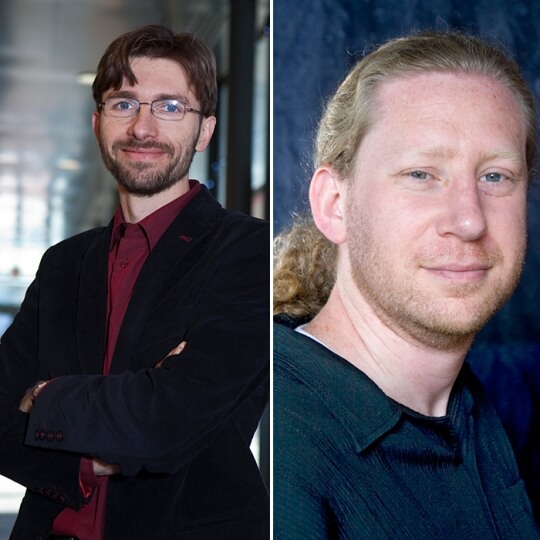News
Harvard President Drew Faust has approved Daniel Needleman (right) and Krzysztof Gajos (left) for promotion to the role of full professor with tenure at the SEAS (Images by Eliza Grinnell/Harvard SEAS)
Harvard President Drew Faust has approved Daniel Needleman and Krzysztof Gajos for promotion to the role of full professor with tenure at the Harvard John A. Paulson School of Engineering and Applied Sciences (SEAS).
Needleman, an applied physicist and molecular biologist, holds a joint appointment at SEAS and in the Department of Molecular and Cellular Biology.
Needleman’s lab investigates how the cooperative behaviors of molecules give rise to the architecture and dynamics of self-organizing subcellular structures. Needleman is especially interested in the spindle, a cellular structure that separates chromosomes and pulls the duplicated DNA from the mother cell into the daughter cell during division. Even though the overall structure of the spindle can remain unchanged for hours, the molecules that make up the spindle undergo rapid turnover and if the spindle is damaged, or even totally destroyed, it can repair itself.
Needleman and his lab aim to understand how these molecular constituents self-organize into the spindle and how this leads to the internal balance of forces that are harnessed to divide the chromosomes.
Needleman received his undergraduate degree from Brandeis University and his PhD from the University of California, Santa Barbara.
Gajos, a computer scientist, is interested in human-computer interaction, artificial intelligence and applied machine learning. He is especially interested in understanding how intelligent technologies can enable novel ways of interacting with computation.
His lab designs and evaluates personalized and adaptive user interfaces and explores questions such as how to design a computer interface for users with dexterity impairment, such as muscular dystrophy.
Gajos received his master’s from MIT and PhD from the University of Washington. He spent a one-year postdoctoral fellowship at Microsoft Research in the Adaptive Systems and Interaction group.
Cutting-edge science delivered direct to your inbox.
Join the Harvard SEAS mailing list.
Press Contact
Leah Burrows | 617-496-1351 | lburrows@seas.harvard.edu
